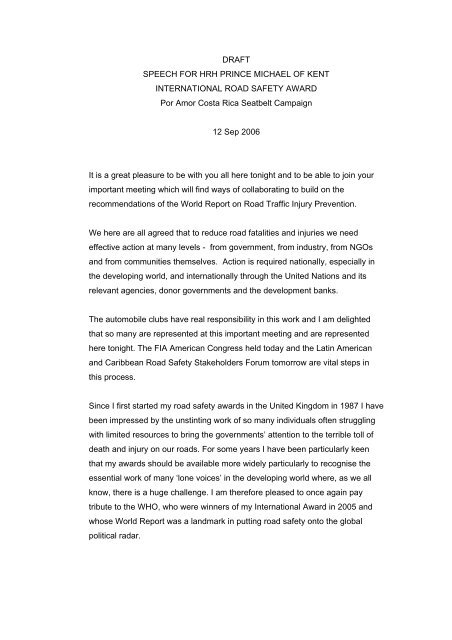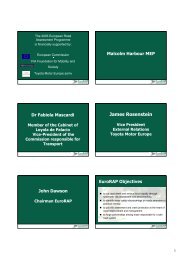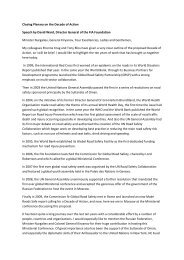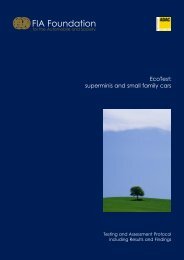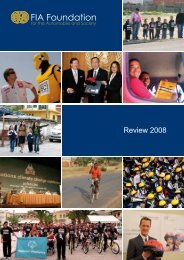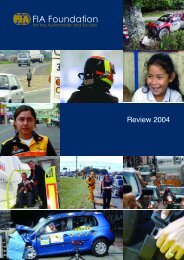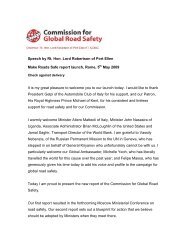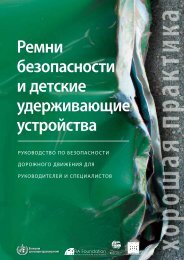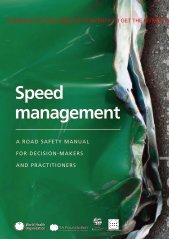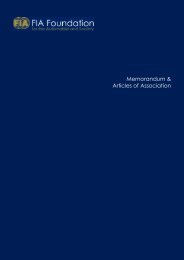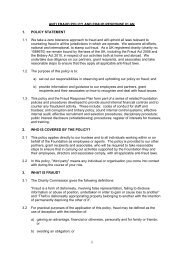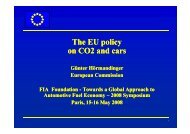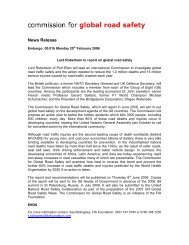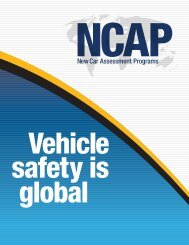draft speech for hrh prince michael of kent - FIA Foundation
draft speech for hrh prince michael of kent - FIA Foundation
draft speech for hrh prince michael of kent - FIA Foundation
Create successful ePaper yourself
Turn your PDF publications into a flip-book with our unique Google optimized e-Paper software.
DRAFT<br />
SPEECH FOR HRH PRINCE MICHAEL OF KENT<br />
INTERNATIONAL ROAD SAFETY AWARD<br />
Por Amor Costa Rica Seatbelt Campaign<br />
12 Sep 2006<br />
It is a great pleasure to be with you all here tonight and to be able to join your<br />
important meeting which will find ways <strong>of</strong> collaborating to build on the<br />
recommendations <strong>of</strong> the World Report on Road Traffic Injury Prevention.<br />
We here are all agreed that to reduce road fatalities and injuries we need<br />
effective action at many levels - from government, from industry, from NGOs<br />
and from communities themselves. Action is required nationally, especially in<br />
the developing world, and internationally through the United Nations and its<br />
relevant agencies, donor governments and the development banks.<br />
The automobile clubs have real responsibility in this work and I am delighted<br />
that so many are represented at this important meeting and are represented<br />
here tonight. The <strong>FIA</strong> American Congress held today and the Latin American<br />
and Caribbean Road Safety Stakeholders Forum tomorrow are vital steps in<br />
this process.<br />
Since I first started my road safety awards in the United Kingdom in 1987 I have<br />
been impressed by the unstinting work <strong>of</strong> so many individuals <strong>of</strong>ten struggling<br />
with limited resources to bring the governments’ attention to the terrible toll <strong>of</strong><br />
death and injury on our roads. For some years I have been particularly keen<br />
that my awards should be available more widely particularly to recognise the<br />
essential work <strong>of</strong> many ‘lone voices’ in the developing world where, as we all<br />
know, there is a huge challenge. I am there<strong>for</strong>e pleased to once again pay<br />
tribute to the WHO, who were winners <strong>of</strong> my International Award in 2005 and<br />
whose World Report was a landmark in putting road safety onto the global<br />
political radar.
In just a few short years much has been achieved. The UN Road Safety<br />
Collaboration, led by WHO, and the new Global Road Safety Facility, hosted by<br />
the World Bank, now provide an institutional framework <strong>for</strong> effective action.<br />
Make Roads Safe, the report <strong>of</strong> the Commission <strong>for</strong> Global Road Safety<br />
published earlier this year, provides a compelling argument <strong>for</strong> why<br />
governments should provide the resources to enable this action on global road<br />
safety.<br />
I also know just how much the <strong>FIA</strong> <strong>Foundation</strong> has done to support, encourage<br />
or lead these initiatives. I am sure that you will all agree that its work since its<br />
creation only five years ago has been quite remarkable. My thanks go not just<br />
to David Ward and his excellent team, but to Max Mosley <strong>for</strong> having the<br />
<strong>for</strong>esight to lead in the establishing <strong>of</strong> the <strong>Foundation</strong> and <strong>for</strong> his unstinting<br />
work in supporting the cause <strong>of</strong> road safety.<br />
Last year I was delighted to be able to present one <strong>of</strong> my awards to the<br />
<strong>Foundation</strong> during the UN Road Safety Collaboration meeting in London.<br />
The award was <strong>for</strong> its Seat Belt Toolkit which includes a manual providing<br />
advice on en<strong>for</strong>cement, awareness raising and legislating <strong>for</strong> seat belt use. The<br />
toolkit is an essential resource <strong>for</strong> any road safety pr<strong>of</strong>essional in the<br />
developing world, or indeed in any state which does not yet have an effective<br />
seat belt regime.<br />
The advice manual and its associated toolkit were developed from real life<br />
experiences in many places, but the acid test <strong>of</strong> the foundation’s successful<br />
approach was the Por Amor seat belt campaign here in Costa Rica during<br />
2003/04 which was a collaborative venture led by The Ministry <strong>of</strong> Transport in<br />
association with The National Safety Council, The National Insurance Institute,<br />
the Costa Rican Automobile Club and indeed the <strong>FIA</strong> <strong>Foundation</strong>.<br />
As many <strong>of</strong> you will know, following a challenge to the law in the 1990s seat<br />
belt wearing had fallen to some 24 per cent. Yet by the summer <strong>of</strong> 2004,<br />
through a combination <strong>of</strong> new legislation, awareness raising and effective<br />
en<strong>for</strong>cement the seat belt wearing level was raised to 82 per cent.
The partnership led by transport ministers Javier Chaves and Karla Gonzalez,<br />
together with Ignacio Sanchez <strong>of</strong> the traffic police and Carlos Macaya from the<br />
Automobile Club effectively changed the behaviour <strong>of</strong> thousands <strong>of</strong> drivers and<br />
as a result saved many lives.<br />
This example is one which should be replicated all over the world and it is <strong>for</strong><br />
this reason that I am delighted to be here tonight to present my international<br />
award to the Por Amor campaign team.


